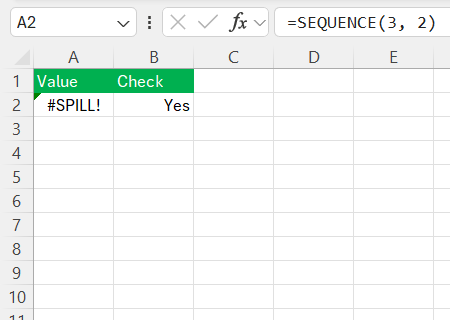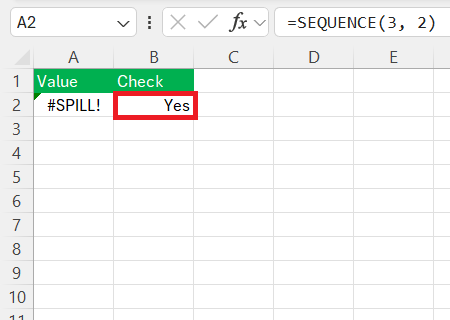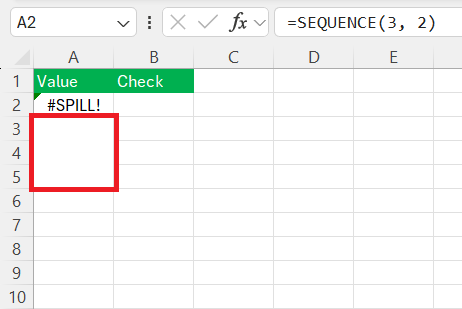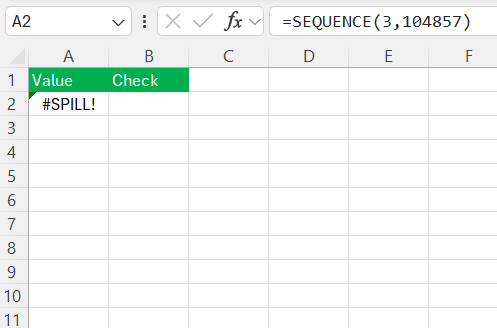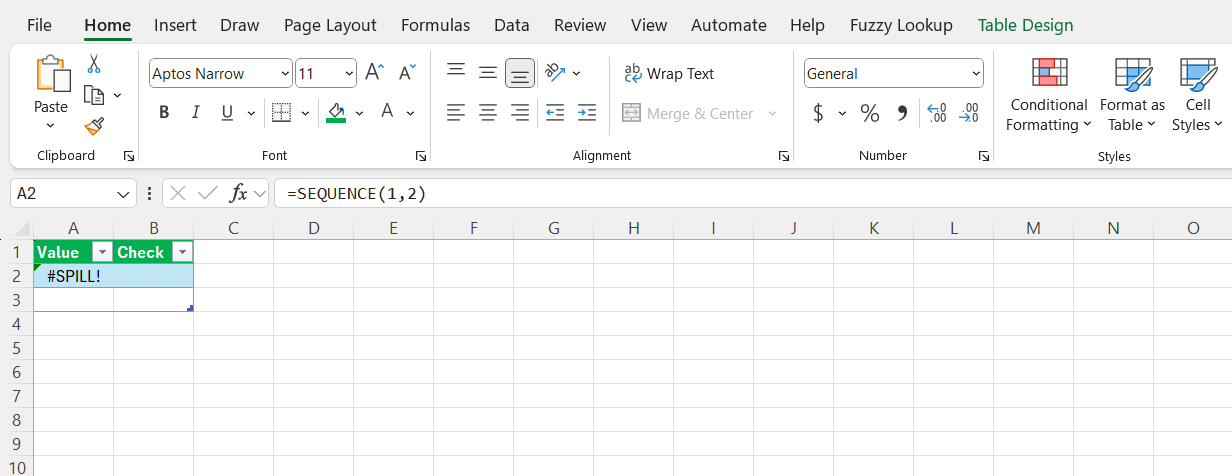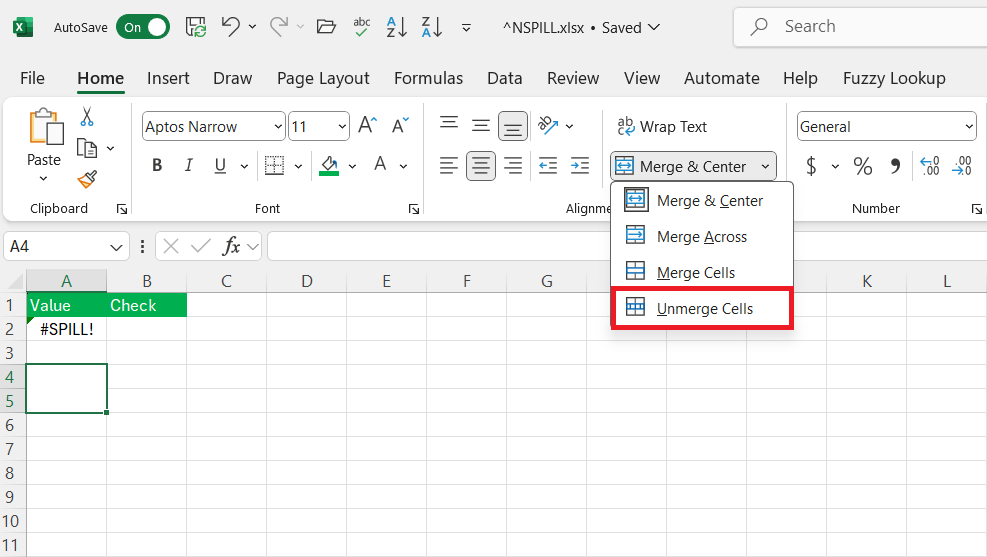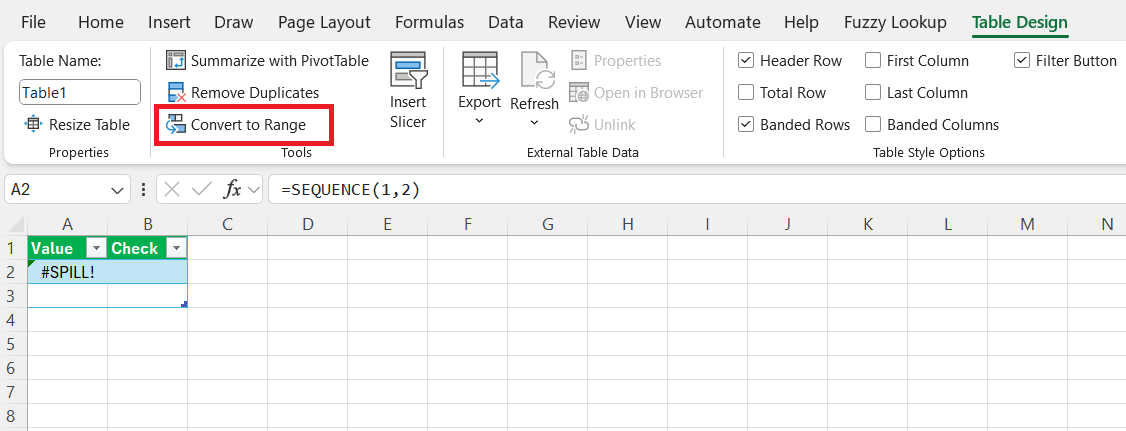Spill errors in Excel happen when we create a formula or function that produces an array of values that can’t fit into the intended range because something is blocking the output. This often occurs with dynamic array formulas, which automatically expand to fill nearby cells. To keep our spreadsheets accurate and functional, it’s important to understand and resolve spill errors. In this article, we’ll explore what causes these errors and share practical ways to fix them.
Key Takeaways:
- Spill errors in Excel occur when a formula’s results can’t fit into the designated range due to blockages.
- Common causes include obstructing data, merged cells, and the spill range extending beyond worksheet boundaries.
- Resolving spill errors often involves clearing obstructing data, unmerging cells, and ensuring enough space for the spill.
- Avoid placing dynamic array formulas within tables, as tables do not support spills.
- Understanding and addressing spill errors is crucial for maintaining accurate and functional spreadsheets.
Table of Contents
Introduction to Spill Errors in Excel
Understanding the Basics of Excel Spill Errors
When we delve into the intricacies of Microsoft Excel, we encounter a variety of functions and formulas designed to simplify our data management tasks. However, even with Excel’s robust features, spills errors can leave us puzzled. A spill error is indicated by #SPILL! and it flags whenever a dynamic array formula can’t return results to a range of cells due to blockages or limitations in the workspace.
The Importance of Addressing Spill Errors
I can’t underscore the importance of promptly addressing spill errors in Excel. They are more than just minor nuisances; these errors can disrupt your data analysis and lead to inaccurate results, which could have significant consequences, especially when dealing with financial or logistical data. It’s crucial to resolve them to maintain the integrity of your datasets and ensure that you can rely on your spreadsheets to make informed decisions.
What Is a SPILL Error?
The SPILL error occurs when Excel tries to output a dynamic array formula but cannot do so because something is obstructing the range where the formula’s results would be displayed. In Excel, dynamic arrays allow formulas to return multiple values in a “spill range”—a range of cells that can expand or contract based on the formula’s output.
For example, if you use a formula like =SEQUENCE(3, 2) in a single cell, Excel will attempt to generate a 3-row by 2-column array of numbers starting from 1. The array would typically “spill” into the cells around the formula. However, if something is blocking one or more of those cells, Excel cannot complete the operation and will display a SPILL error instead of the expected array.
Common Causes of SPILL Errors
- Obstructing Data: The most common cause of a SPILL error is that one or more cells in the expected spill range already contain data. For example, if you enter a dynamic array formula that would output to a range where some cells are non-empty, the formula will not work.
- Merged Cells: If the spill range includes merged cells, Excel cannot spill the array. Merged cells create an irregular grid that Excel can’t process for dynamic arrays.
- Spill Range Outside the Worksheet Boundary: If the spill range extends beyond the edge of the worksheet (i.e., beyond the last row or column), Excel cannot perform the spill operation.
- Tables: If the formula is in a table, Excel will return a SPILL error because tables do not support dynamic arrays spilling into adjacent cells. Excel expects the output of a formula in a table to be confined within the table’s structure.
How to Resolve SPILL Errors
- Check for Obstructing Data: Look at the cells where the formula is supposed to spill. If any of these cells contain data, delete or move the contents. Excel will automatically spill the array once the obstruction is removed.
- Unmerge Cells: If merged cells are causing the issue, unmerge them and try the formula again. Excel needs a clear, unmerged range to display the dynamic array.
- Adjust the Formula Location: If the spill range exceeds the worksheet boundary, move the formula to a different location in the worksheet where there’s enough space for the entire array.
- Avoid Using Tables for Dynamic Arrays: If you need to use dynamic arrays, place the formula outside of any tables or convert the table into a regular range.
- Review the Formula: Ensure that the formula is correctly written and does not contain syntax errors. Excel may be unable to determine the spill range if the formula is not valid.
Advanced Tips for Seasoned Excel Users
Navigating Complex Spill-Related Formulas
Navigating complex spill-related formulas calls for a blend of analytical thinking and Excel expertise. If a formula is giving you a hard time with spill errors, try breaking it down into smaller, more manageable parts. Once each segment is confirmed to be error-free, gradually build up to the original complexity.
This step-by-step approach can often shed light on where things are going awry. And remember the use of Excel’s Formula Auditing tools, like ‘Trace Precedents’ and ‘Evaluate Formula,’ can provide invaluable insights into how your formula is operating, allowing you to tweak it to perfection.
FAQ: Solve Your Specific Spill Error Queries
What are spills in Excel?
In Excel, spills refer to a feature that allows formulas to automatically fill or ‘spill’ over into adjacent cells when they return multiple values. This happens with dynamic array formulas that output an array result, and Excel dynamically resizes and fills the formula across the necessary cells without requiring old-school Ctrl+Shift+Enter to activate it.
How do I fix a spill error in Excel?
To fix a spill error in Excel, check for obstructions in the spill range and clear any cells blocking the formula’s output. Make sure no merged cells are in the way and that your array formula has enough space to display all its results. If the problem persists, consider whether the size of the spill is too large for your intended range and adjust accordingly.
What are the first steps I should take when I encounter a spill error?
When encountering a spill error, start by examining the error message and the cells where the spill is supposed to occur. Look for the yellow warning triangle or hover over the cell to get more details. Next, inspect the spill range for any obstacles like non-empty cells, data validations, or merged cells that might block the spill, and rectify these issues. This initial diagnosis is essential for identifying the root cause and applying the correct solution.
Can merged cells always lead to spill errors and how do I fix them?
Yes, merged cells can certainly lead to spill errors because Excel’s dynamic arrays cannot spill into merged areas. To fix them, simply unmerge any merged cells within the spill range. If unmerging is not an option due to your formatting needs, consider relocating your formula to a different area of the spreadsheet without merged cells or adjusting your layout to avoid them within the spill area.
How do you get rid of spill in Excel?
To get rid of a spill in Excel, first clear any obstructing content from the spill range. If that doesn’t work, ensure that dynamic arrays have sufficient room to display all results by adjusting your sheet’s layout. As a last resort, convert tables to ranges when using spillable formulas within them, as tables do not currently support dynamic arrays.
John Michaloudis is a former accountant and finance analyst at General Electric, a Microsoft MVP since 2020, an Amazon #1 bestselling author of 4 Microsoft Excel books and teacher of Microsoft Excel & Office over at his flagship MyExcelOnline Academy Online Course.

